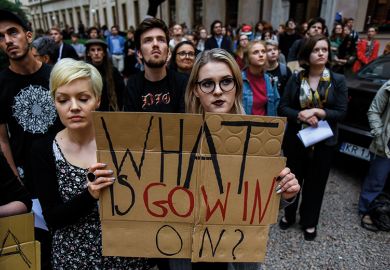Polish universities are on “a collision course” with the government, according to a university leader who has claimed that “the last fortress of democratic society” in the country was under attack.
Universities have been caught in the crossfire of the recent protests against a court ruling that would outlaw almost all abortions, after 15 institutions decided to cancel classes on one of the days of the demonstrations – the largest in Poland since the fall of communism – thus enabling students and academics to attend.
The new education and science minister responded by threatening to withdraw funding from those universities.
“Please do not forget that I am competent to distribute investment funds for universities, research funds and other grants. The ministry will take into account the recent actions of the authorities of these universities,” warned Przemysław Czarnek, a member of the ruling Law and Justice party who has been in the post for a month and is known for his opposition to LGBT and women’s rights.
Przemysław Wiszewski, rector of the University of Wrocław, one of the institutions that cancelled classes, said he wanted to give students and academics the choice of whether to take part in the protests and avoid “quarrels and violent speech” taking place within the campus community.
The minister’s threat has been interpreted as largely rhetorical as the majority of university funding in Poland is not administered by the education ministry, but Professor Wiszewski said he was concerned that it was part of a broader attack against the independence of higher education. The education minister, who is a professor at the John Paul II Catholic University of Lublin, also wants to reorient curricula “towards the teaching of the church and the national vision of history and culture”, Professor Wiszewski said.
“We are in trouble because he’s setting values and aims that are absolutely different from ours as researchers. So we are on a collision course,” he said, adding that the erosion of the independence of the country’s justice system began as “small changes and then it snowballed”.
“We are the last fortress of democratic society. I’m afraid we are just the last element of this puzzle.”
Professor Wiszewski said that the middle of a pandemic was “a good moment for the government to charge and to destroy what’s left of democratic society”.
“I don’t have any illusions that when the government wants to destroy the independence of the university, the whole nation will stand up and say: ‘That’s not allowed.’ Absolutely not – people have greater worries than the future of the university,” he said.
Weronika Grzebalska, an assistant professor in political studies at the Polish Academy of Sciences, who researches nationalism and right-wing politics from a gender perspective, said that the government was attempting “a serious power grab on higher education”.
“All of this creates a hostile atmosphere around academia and around certain strands of research. This might push academics towards self-censorship because they are concerned if they write about gender, for example, they might not have state funding, and some institutions may think twice before giving money in certain areas,” she said.
Dr Grzebalska added that an “ideological reshaping of higher education” was made possible by a “broader neoliberal turn in the last 15 years” that has put more power in the hands of rectors, at the expense of the academic community, and placed more emphasis on competitiveness rather than academic freedom.
“Most probably the new minister will use this already de-democratised neoliberal system of academia and pursue a number of chaotic ideology-driven interventions,” she said.
Register to continue
Why register?
- Registration is free and only takes a moment
- Once registered, you can read 3 articles a month
- Sign up for our newsletter
Subscribe
Or subscribe for unlimited access to:
- Unlimited access to news, views, insights & reviews
- Digital editions
- Digital access to THE’s university and college rankings analysis
Already registered or a current subscriber?








